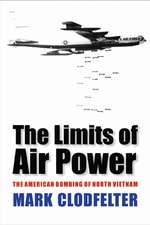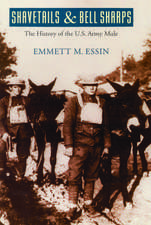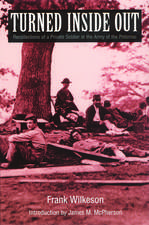Beneficial Bombing: The Progressive Foundations of American Air Power, 1917-1945: Studies in War, Society, and the Military
Autor Mark Clodfelteren Limba Engleză Paperback – 30 noi 2013
The Progressive Era, marked by a desire for economic, political, and social reform, ended for most Americans with the ugly reality and devastation of World War I. Yet for Army Air Service officers, the carnage and waste witnessed on the western front only served to spark a new progressive movement—to reform war by relying on destructive technology as the instrument of change. In Beneficial Bombing Mark Clodfelter describes how American airmen, horrified by World War I’s trench warfare, turned to the progressive ideas of efficiency and economy in an effort to reform war itself, with the heavy bomber as their solution to limiting the bloodshed. They were convinced that the airplane, used as a bombing platform, offered the means to make wars less lethal than conflicts waged by armies or navies.
Clodfelter examines the progressive idealism that led to the creation of the U.S. Air Force and its doctrine that the finite destruction of precision bombing would end wars more quickly and with less suffering for each belligerent. What is more, his work shows how these progressive ideas emerged intact after World War II to become the foundation of modern U.S. Air Force doctrine. Drawing on a wealth of archival material, including critical documents unavailable to previous researchers, Clodfelter presents the most complete analysis ever of the doctrinal development underpinning current U.S. Air Force notions about strategic bombing.
| Toate formatele și edițiile | Preț | Express |
|---|---|---|
| Paperback (1) | 221.38 lei 6-8 săpt. | |
| Nebraska Paperback – 30 noi 2013 | 221.38 lei 6-8 săpt. | |
| Hardback (1) | 434.12 lei 6-8 săpt. | |
| Nebraska – 31 dec 2010 | 434.12 lei 6-8 săpt. |
Din seria Studies in War, Society, and the Military
-
 Preț: 163.51 lei
Preț: 163.51 lei -
 Preț: 105.75 lei
Preț: 105.75 lei -
 Preț: 322.37 lei
Preț: 322.37 lei -
 Preț: 206.33 lei
Preț: 206.33 lei -
 Preț: 216.87 lei
Preț: 216.87 lei -
 Preț: 134.21 lei
Preț: 134.21 lei -
 Preț: 136.91 lei
Preț: 136.91 lei -
 Preț: 200.42 lei
Preț: 200.42 lei -
 Preț: 126.80 lei
Preț: 126.80 lei -
 Preț: 189.93 lei
Preț: 189.93 lei -
 Preț: 150.95 lei
Preț: 150.95 lei -
 Preț: 109.10 lei
Preț: 109.10 lei -
 Preț: 164.76 lei
Preț: 164.76 lei -
 Preț: 469.83 lei
Preț: 469.83 lei -
 Preț: 221.77 lei
Preț: 221.77 lei -
 Preț: 214.42 lei
Preț: 214.42 lei -
 Preț: 214.00 lei
Preț: 214.00 lei -
 Preț: 221.16 lei
Preț: 221.16 lei -
 Preț: 469.92 lei
Preț: 469.92 lei -
 Preț: 465.58 lei
Preț: 465.58 lei -
 Preț: 211.16 lei
Preț: 211.16 lei -
 Preț: 227.38 lei
Preț: 227.38 lei -
 Preț: 332.39 lei
Preț: 332.39 lei -
 Preț: 220.57 lei
Preț: 220.57 lei -
 Preț: 187.25 lei
Preț: 187.25 lei -
 Preț: 259.16 lei
Preț: 259.16 lei -
 Preț: 184.95 lei
Preț: 184.95 lei -
 Preț: 361.36 lei
Preț: 361.36 lei -
 Preț: 185.13 lei
Preț: 185.13 lei -
 Preț: 327.17 lei
Preț: 327.17 lei -
 Preț: 328.90 lei
Preț: 328.90 lei - 15%
 Preț: 467.89 lei
Preț: 467.89 lei -
 Preț: 226.18 lei
Preț: 226.18 lei -
 Preț: 185.13 lei
Preț: 185.13 lei -
 Preț: 405.12 lei
Preț: 405.12 lei -
 Preț: 393.58 lei
Preț: 393.58 lei -
 Preț: 147.28 lei
Preț: 147.28 lei -
 Preț: 392.44 lei
Preț: 392.44 lei -
 Preț: 325.05 lei
Preț: 325.05 lei
Preț: 221.38 lei
Nou
Puncte Express: 332
Preț estimativ în valută:
42.37€ • 44.07$ • 34.98£
42.37€ • 44.07$ • 34.98£
Carte tipărită la comandă
Livrare economică 12-26 aprilie
Preluare comenzi: 021 569.72.76
Specificații
ISBN-13: 9780803271807
ISBN-10: 0803271808
Pagini: 390
Ilustrații: 34 photographs
Dimensiuni: 152 x 229 x 27 mm
Greutate: 0.52 kg
Editura: Nebraska Paperback
Colecția University of Nebraska Press
Seria Studies in War, Society, and the Military
Locul publicării:United States
ISBN-10: 0803271808
Pagini: 390
Ilustrații: 34 photographs
Dimensiuni: 152 x 229 x 27 mm
Greutate: 0.52 kg
Editura: Nebraska Paperback
Colecția University of Nebraska Press
Seria Studies in War, Society, and the Military
Locul publicării:United States
Notă biografică
Mark Clodfelter is a professor of military strategy at the National War College. He is the author of The Limits of Air Power: The American Bombing of North Vietnam, available in a Bison Books edition.
Cuprins
List of Illustrations
Acknowledgments
Source Acknowledgments
Introduction
1. Genesis in the Great War
2. Progressive Prophecy
3. From Prophecy to Plan
4. Breaching Fortress Europe, 1942-43
5. Bludgeoning with Bombs: Germany, 1944-45
6. Fire from the Sky: Japan, 1944-45
7. Progressive Legacies
Notes
Bibliography
Index
Acknowledgments
Source Acknowledgments
Introduction
1. Genesis in the Great War
2. Progressive Prophecy
3. From Prophecy to Plan
4. Breaching Fortress Europe, 1942-43
5. Bludgeoning with Bombs: Germany, 1944-45
6. Fire from the Sky: Japan, 1944-45
7. Progressive Legacies
Notes
Bibliography
Index
Recenzii
“A thoughtful and well written account of a central thread in the thinking of American airpower advocates and the way its implementation in two world wars took place at the time, was seen afterwards, and has come to be enormously influential in the decision process of our country’s leaders into the twenty-first century.”—Gerhard L. Weinberg, professor emeritus at the University of North Carolina at Chapel Hill and winner of the Pritzker Military Library Literature Award
“This is military, intellectual history at its best.”—Colonel Gian P. Gentile, Journal of American History
“A solid and impressive study that will enlighten those interested in the formation of bombing theory (Douhet through Warden) and especially its practice in World War II.”—Kenneth P. Werrell, Air Power History
“Beneficial Bombing views a somewhat familiar tale through a fresh interpretive lens, complementing other works examining air power's morality and effectiveness. . . . Based almost entirely on new research in a wide array of primary sources, it illuminates the intellectual and philosophical underpinnings of America's air power.”—Richard R. Muller, Journal of Military History

























